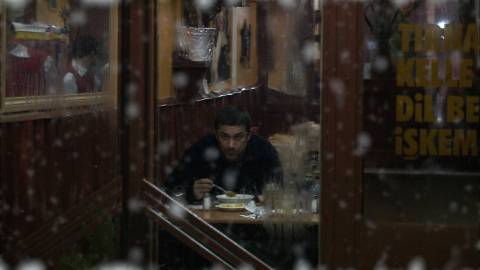-
Nuri Bilge Ceylan: Climates (2006)
NURI BILGE CEYLAN: CLIMATES (2006)

Zero by the hygrometer
Turkish director Ceylan is uncompromising in his alienated view of relationships here. Issa, the hero, if we may call him that, played by Ceylan himself, and his luminous-faced, smiling, but quick to weep girlfriend Bahar (Ceylan’s wife Ebru), see their life together fail while they are on a holiday trip by the sea, and move apart when they return to Istanbul. Later Issa tries again, going to a remote snowy location in the East where Bahar is at work on a long TV project, but they part again. And the snow comes down. The End. In between Issa goes back to a former lover, Serap (Nazan Kesal), and they have a violent sex session on the floor. Is it a bitch-fight, a rape, or passion? It’s hard to say. (There are moments of dry humor too.) There is other violence: Bahar causes an accident when she and Issa are riding a motorcycle by momentarily blinding him. But in between, there is much silence. Ceylan is a master of the long stare and of silences. He requires patience. But there’s a rhythm to his melancholy and a keen sense of the visual that can be satisfying.
What makes you care about the silences is that they seem real. The sedate pace of the film reminds one that relationships in fact take a long time to develop. They don't generally begin or end overnight. But the non-responses are so excruciating at times one wishes these people would just try to say something, anything.
There is a decrepit quality about Ceylan’s perpetually downcast, unshaven hero. He is drenched in ennui, and unwilling to seem vulnerable. Issa is older than Bahar, yet he has yet to finish his thesis. He teaches classes at the university. He's a pretentious loser who's not ready to put much energy into his pretense. (There may be a kind of glamour about this kind of character for ordinary people -- for ambitious university students, for instance. It's the glamour of existentialism; of Camus' Stranger.) Issa photographs old buildings and ruins. But he is going nowhere. Precisely for that reason he assures Bahar when he returns to her that he has changed, and can change some more. He lies and says he hasn’t seen Serap again (he had an affair with with Serap that Bashar knows about before this last encounter, so she can guess what has happened).
Ceylan is at home with dark and cold. Issa's small hotel room in the cold snowy East is wonderfully gloomy as he sits there in the dim light from outside. The crunch of the snow, like the tiny crackle of a burning cigarette, is a vivid reminder of an unfriendly world. The tinkle of a little music box smuggled in from the Gulf countries shows how weak is the chance of a reconciliation. When Issa meets Bahar with photos of their vacation and the gift of the music box, she goes off leaving them both on the table. No time for a second glass of tea. When he appeals to her the next day in a small van, the futility of his plea is cuningly underlined by being constantly interupted by people opening the door and stuffing in equipment for the next shoot.
As Anthony Lane said about Ceylan’s Distant (Uzak), winner of the Jury Prize at Cannes in 2003, which I have not seen, his world is unfamiliar. It might resemble Tarkovsky (a clip from whose Stalker appears in the previous film) but there are Turkish mountains and minarets in the background. The HD photography is quite beautiful, especially in the exteriors and the snow scenes. Obviously a festival favorite; and this is good festival stuff. But Ceylan seems not yet to have caught on with American arthouse audiences. This from the sound of it is a more accessible film than Distant. But if the exposure isn’t there, audiences won’t have a chance to respond, and so far this Turkish writer/director is the specialty of a small clique of devotes. It has a distributor, though: Zeitgeist Films.
Climates (Ikimler) won the Fipresci Award at Cannes this year.
Last edited by Chris Knipp; 03-25-2017 at 11:32 AM.
 Posting Permissions
Posting Permissions
- You may not post new threads
- You may not post replies
- You may not post attachments
- You may not edit your posts
-
Forum Rules





 Reply With Quote
Reply With Quote
Bookmarks